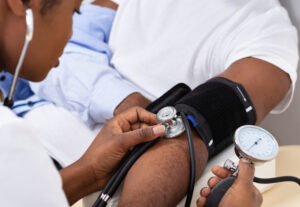Low libido, or diminished sexual desire, is a complex issue that can profoundly impact men’s lives, relationships, and overall well-being.
While it is often attributed solely to aging, the reality is far more nuanced.
From hormonal imbalances and physical ailments to psychological challenges and lifestyle habits, the causes of reduced sexual drive are diverse and interconnected.
Recognizing and addressing the underlying factors effectively can restore a man’s libido, confidence, and emotional health.
This article explores the root causes of low libido, offering insight into why this issue arises and how men can regain control over their sexual health.
Causes of Low Libido in Men

Low libido in men can stem from various physical, psychological, and lifestyle factors.
Common causes include hormonal imbalances, chronic health conditions, psychological stress, and medication side effects.
Understanding these contributors is vital to pinpointing effective treatments and preventing further health complications.
1. Hormonal Imbalances
Testosterone, the hormone responsible for sexual desire in men, naturally declines with age.
By the time men reach their 40s, testosterone levels may drop by approximately 1% annually.
Low testosterone, known medically as hypogonadism, directly impacts libido, reducing sexual thoughts, arousal, and satisfaction.
Beyond testosterone, other hormonal imbalances, such as elevated prolactin levels or thyroid dysfunctions, can suppress sexual desire.
Research indicates that men with low testosterone often experience fatigue, depression, and a lack of motivation, compounding the issue of decreased libido.
2. Psychological Factors
Mental health plays an enormous role in regulating libido.
Stress, anxiety, and depression are particularly detrimental, with their effects exacerbated by modern lifestyles filled with work deadlines, financial concerns, and personal pressures.
Stress elevates cortisol levels, a hormone that suppresses testosterone production.
A study highlights that depression can lead to a 50% decrease in libido, even in men without prior sexual dysfunction.
Furthermore, performance anxiety can create a vicious cycle: worrying about sexual performance diminishes desire, and reduced libido intensifies performance-related stress.
3. Relationship Challenges

Problems within a romantic relationship can significantly affect sexual desire.
Emotional disconnection, unresolved conflicts, lack of communication, or infidelity can create barriers to intimacy.
Men in unhappy relationships may subtly and subconsciously withdraw from sexual activities, eventually resulting in feelings of frustration and dissatisfaction on both sides.
For example, the Kinsey Institute notes that communication breakdowns in relationships are consistently listed among the top reasons for decreased libido in men.
In such cases, fostering emotional intimacy and trust becomes essential. Methods like counseling or open dialogue can effectively work to rekindle lost sexual desire.
Ultimately, by addressing these emotional barriers, couples can strengthen their bond and reignite their passion.
4. Physical Health Conditions

Chronic illnesses, such as diabetes, hypertension, and cardiovascular disease, have a direct impact on libido.
These conditions impair blood flow and nerve sensitivity, essential components of sexual arousal.
For instance, erectile dysfunction (ED), often linked to cardiovascular issues, frequently coexists with low libido.
Metabolic conditions, such as obesity, further complicate the situation by disrupting hormone levels and reducing energy, making physical activity — and, by extension, sexual activity — less appealing.
The National Institutes of Health reports that men with a higher weight are 50% more likely to experience reduced libido than their normal-weight counterparts.
5. Lifestyle and Environmental Factors

Modern habits, such as sedentary lifestyles, poor diet, excessive alcohol use, and smoking, are also significant contributors to low libido.
High-fat diets and junk food lead to weight gain and reduced testosterone levels.
Alcohol, while often seen as a social lubricant, can lower inhibitions temporarily but has long-term detrimental effects on testosterone and sexual function.
Additionally, environmental toxins, including endocrine-disrupting chemicals found in plastics and pesticides, can interfere with hormonal balance, further suppressing libido.
6. Medications and Their Side Effects
Certain prescription medications, such as antidepressants, antihypertensives, and opioids, are known to dampen libido as a side effect.
For instance, selective serotonin reuptake inhibitors (SSRIs), commonly prescribed for depression, can reduce sexual interest and delay orgasm.
If medication is suspected to be the cause, it is critical to consult a doctor to explore alternatives or adjust dosages.
Symptoms of Low Libido in Men

Recognizing low libido involves identifying persistent changes in sexual desire that go beyond infrequent lack of interest. Key symptoms include:
- Reduced Sexual Thoughts or Fantasies: A noticeable decrease in sexual imagination or interest, even when in a romantic setting.
- Avoidance of Intimacy: Reluctance or avoidance of physical closeness or sexual activity with a partner.
- Emotional Detachment: Feeling disconnected or distant in intimate relationships.
- Physical Signs: Experiencing fatigue, trouble achieving or maintaining an erection, and decreased satisfaction during sexual activity.
- Psychological Impact: Feelings of frustration, low self-esteem, and shame, as sexual performance and desire, are often associated with perceptions of masculinity.
Early recognition and addressing of these symptoms are crucial to prevent potential adverse effects on mental health and relationships.
Treatments for Low Libido in Men
Addressing low libido involves a multifaceted approach that includes medical treatments, psychological support, as well as lifestyle changes.
In fact, effective strategies range from hormone therapy to stress management while also encompassing therapeutic interventions.
Importantly, identifying the right solution often requires collaboration with healthcare providers for personalized care, ensuring that each approach is tailored to the individual’s unique needs and circumstances.
1. Hormone Therapy
When low testosterone is identified as the root cause, hormone replacement therapy (HRT) can help restore levels to a healthy range.
This treatment is particularly beneficial for older men whose testosterone has naturally declined.
Methods such as topical gels, injections, or patches are commonly used under a healthcare provider’s supervision.
2. Psychological Counseling

Psychological issues like stress, anxiety, or relationship difficulties require targeted interventions.
Cognitive-behavioral therapy (CBT) or sex therapy can help men address their concerns, rebuild self-confidence, and improve communication with their partners.
Additionally, Therapy sessions also help couples explore ways to restore emotional and physical intimacy.
3. Lifestyle Modifications
Adopting healthier habits can significantly improve libido. Regular exercise boosts testosterone levels, increases energy, and enhances overall mood.
A diet rich in lean protein, whole grains, fruits, and vegetables supports hormone production and maintains cardiovascular health, which is essential for sexual arousal.
Limiting alcohol consumption and quitting smoking can further enhance libido.
Studies show that men who engage in regular physical activity are 30% less likely to experience sexual dysfunction compared to their sedentary counterparts (Journal of Urology).
4. Medication Adjustments
If prescribed medications are affecting sexual desire, discussing alternative treatments with a doctor is crucial.
Also, Some drugs have fewer sexual side effects and may restore normal libido without compromising health.
5. Stress Management Techniques

Incorporating stress-relief practices like yoga, meditation, or deep breathing exercises can regulate cortisol levels, directly improving libido.
Many men also benefit from engaging in hobbies or spending quality time with loved ones to reduce stress and enhance their overall outlook.
Boosting Sexual Desire Naturally

Men looking to rejuvenate their sex drive can explore:
- Regular physical activity, such as cardio or strength training.
- A diet rich in fruits, vegetables, whole grains, and lean proteins.
- Open communication with a partner to strengthen emotional connections.
Conclusion

Low libido is a sensitive yet treatable condition that affects many men at various stages of life.
By identifying and addressing the underlying causes—whether hormonal, psychological, or lifestyle-related—men can regain control of their sexual health and overall well-being.
The key lies in open communication with partners and healthcare providers, early intervention, and a commitment to healthier living.
———————————————————
Is your libido affecting your confidence or relationship? If so, it’s time to take charge of your health today and explore solutions tailored to your needs.
At Enthusiast Express, we truly understand the unique challenges men face, especially when it comes to sexual health and well-being.
That’s why we offer a supportive space where men can find valuable resources, engage in meaningful conversations, and access expert advice to navigate and overcome issues like low libido.
By joining us, you’ll discover practical tips, insights, and the reassurance that you’re not alone on this journey.
Let’s take the first step toward improving your well-being and confidence together.


Thanks for sharing. I read many of your blog posts, cool, your blog is very good.
Thank you for your sharing. I am worried that I lack creative ideas. It is your article that makes me full of hope. Thank you. But, I have a question, can you help me?
Your point of view caught my eye and was very interesting. Thanks. I have a question for you.